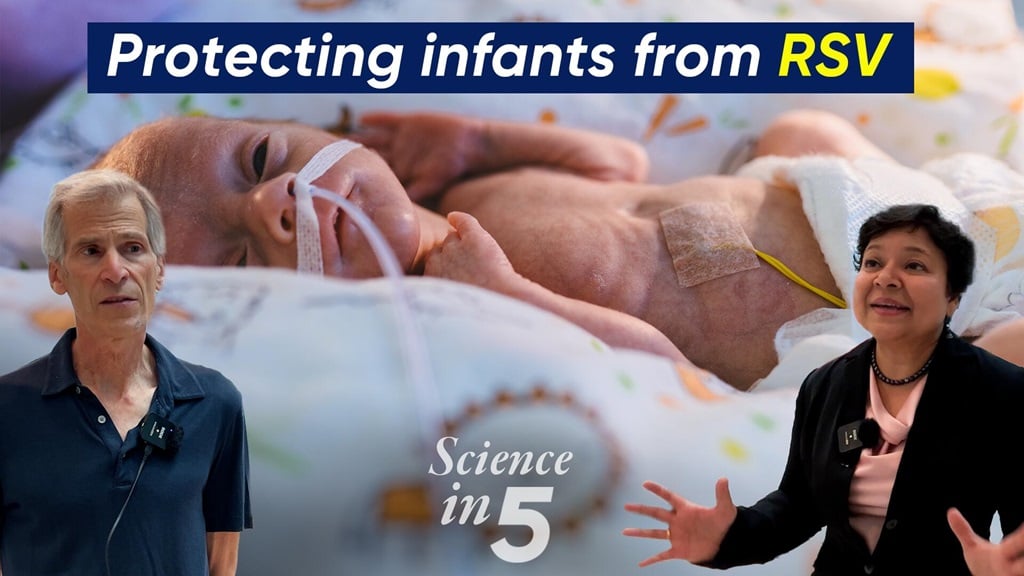Episode #144 – Little lungs, big risks: the RSV threat to infants
Alternative media
Related links
Transcript
VGS This will surprise you. Nearly every child is infected by this virus before the age of two. For most, it is mild. But it is also the leading cause of infant hospitalizations, putting nearly 10 000 infants in hospitals every day. We are talking about RSV or respiratory syncytial virus. And our expert today is Doctor Daniel Feikin. So, let's talk about the global impact of RSV. What should people know about this virus and who does it impact?
Many people think cholera is a disease of the past, but it really isn't. In fact, in the recent years, as many as 30 countries from across the globe have been reporting outbreaks every year. What do you need to know about cholera and how can you prevent it? Welcome, Kate. So, what is cholera and why is it still on the rise?
DF Thank you Vismita. RSV is a highly contagious virus is spread by sneezing, coughing, even touching contaminated surfaces. In fact, every child is infected before their second birthday, and every year it causes 33 million cases of lower respiratory tract infection like pneumonia and bronchiolitis in young children. It causes over 3 million hospitalizations each year, and it tends to fill up hospital beds in the RSV season. But the most concerning is that it leads to over 100 000 deaths each year in children. Half of those in children under six months of age.
VGS So as a parent, that worries me. What are the symptoms that parents should be looking out for?
DF Well, RSV typically starts as a common cold. So runny nose, coughing, sneezing. But it can get very serious. And when that happens the child has wheezing. They have difficulty feeding. They're very sleepy. They have difficulty breathing. And they can even get blue lips and blue fingernails. These are medical emergencies. And if your child has any of those symptoms, you should take them in to be seen by a medical professional immediately.
VGS So how can parents prevent their infants getting RSV?
DF Well, there's good news about that. Now, after decades of research and lots of frustration. We now have two effective immunization products against RSV. The first one is a vaccine that can be given to pregnant women in her third trimester, and she will pass on antibodies to her unborn baby so that when her baby is born, he or she already has antibodies, which will protect that baby through six months of age.
The second product is called a monoclonal antibody, and it's given directly to the child like a vaccine as soon as possible after birth. And it also will protect that baby through six months of age.
VGS So that's great news. Are there additional ways parents can protect their babies?
DF Yes there is. Parents can wash their hands to prevent passing on viruses to their babies. They shouldn't smoke around their babies, and they should avoid contact with people who have respiratory illnesses. But the most important way to prevent RSV in a young baby is to get them immunized. Now, the high season for RSV tends to be in the fall and winter, so now is a good time to ask your doctor about RSV immunization. If you're pregnant, or if you have a newborn at home.
VGS It's difficult for parents to see their children fall sick, and you, as a WHO expert, have also experienced this as a parent. Please share that with us.
DF That's right. I lived and worked in Kenya for a number of years and every year during the RSV season, I would see the hospital wards fill up with children having difficulty breathing. Sometimes there'd be 2 or 3 per bed. They'd be sharing oxygen tubes through a single oxygen, and it was really a chaotic and really scary time in the hospitals. But then it hit even closer to home. My wife had gone back to the US to deliver our second baby, and our older son, who was two at the time, developed RSV, got very severe and was hospitalized.
By that time, I'd gone back to Kenya, so she was alone with a newborn and a sick child in the hospital, and I was half a world away. So, it was really a terrifying experience. Fortunately, he did get better, but I do wish that we had these immunization products back that would have saved our family a lot of traumatic experiences.
VGS Scary story, and thank you for sharing that. So for parents out there, there are vaccines. There are ways to prevent this so that you can keep your infants safe. That was science in five today. Until next time then, stay safe, stay healthy and stick with science.

